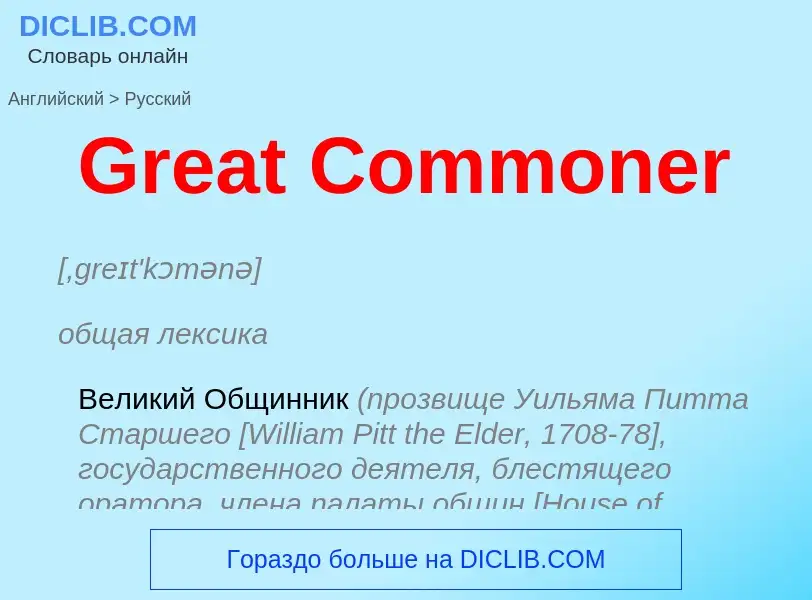Перевод и анализ слов искусственным интеллектом ChatGPT
На этой странице Вы можете получить подробный анализ слова или словосочетания, произведенный с помощью лучшей на сегодняшний день технологии искусственного интеллекта:
- как употребляется слово
- частота употребления
- используется оно чаще в устной или письменной речи
- варианты перевода слова
- примеры употребления (несколько фраз с переводом)
- этимология
Great Commoner - перевод на русский
[,greɪt'kɔmənə]
общая лексика
Великий Общинник (прозвище Уильяма Питта Старшего [William Pitt the Elder, 1708-78], государственного деятеля, блестящего оратора, члена палаты общин [House of Commons])
[,dʒentlmən'kɔmənə]
история
привилегированный студент (последнего курса Оксфордского университета [Oxford University], пользовавшийся правом обедать за "высоким столом" [high table]; вносил дополнительную плату)
Определение
Википедия

William Pitt, 1st Earl of Chatham, (15 November 1708 – 11 May 1778) was a British Whig statesman who served as Prime Minister of Great Britain from 1766 to 1768. Historians call him Chatham or William Pitt the Elder to distinguish him from his son William Pitt the Younger, who was also a prime minister. Pitt was also known as the Great Commoner, because of his long-standing refusal to accept a title until 1766.
Pitt was a member of the British cabinet and its informal leader from 1756 to 1761 (with a brief interlude in 1757), during the Seven Years' War (including the French and Indian War in the American colonies). He again led the ministry, holding the official title of Lord Privy Seal, between 1766 and 1768. Much of his power came from his brilliant oratory. He was out of power for most of his career and became well known for his attacks on the government, such as those on Walpole's corruption in the 1730s, Hanoverian subsidies in the 1740s, peace with France in the 1760s, and the uncompromising policy towards the American colonies in the 1770s.
Pitt is best known as the wartime political leader of Britain in the Seven Years' War, especially for his single-minded devotion to victory over France, a victory which ultimately solidified Britain's dominance over world affairs. He is also known for his popular appeal, his opposition to corruption in government, his support for the American position in the run-up to the American Revolutionary War, his advocacy of British greatness, expansionism and empire, and his antagonism towards Britain's chief enemies and rivals for colonial power, Spain and France. Marie Peters argues his statesmanship was based on a clear, consistent, and distinct appreciation of the value of the Empire.
The British parliamentary historian P. D. G. Thomas argued that Pitt's power was based not on his family connections but on the extraordinary parliamentary skills by which he dominated the House of Commons. He displayed a commanding manner, brilliant rhetoric, and sharp debating skills that cleverly utilised broad literary and historical knowledge. Scholars rank him highly among all British prime ministers.


![[[Robert Clive]]'s victory at the [[Battle of Plassey]] established the [[East India Company]] as a military as well as a commercial power. [[Robert Clive]]'s victory at the [[Battle of Plassey]] established the [[East India Company]] as a military as well as a commercial power.](https://commons.wikimedia.org/wiki/Special:FilePath/Clive.jpg?width=200)
![Hanover]], which would blight their relations for twenty years. Hanover]], which would blight their relations for twenty years.](https://commons.wikimedia.org/wiki/Special:FilePath/GeorgeIIWootton1743.jpg?width=200)
![Henry Fox]]. Henry Fox]].](https://commons.wikimedia.org/wiki/Special:FilePath/Henry Fox, 1st Baron Holland by John Giles Eccardt.jpg?width=200)
![Lord Bute]]'s rise to power between 1760 and 1762 dramatically influenced the emphasis of Britain's war effort. Like the new king, Bute favoured an end to British involvement on the continent. Lord Bute]]'s rise to power between 1760 and 1762 dramatically influenced the emphasis of Britain's war effort. Like the new king, Bute favoured an end to British involvement on the continent.](https://commons.wikimedia.org/wiki/Special:FilePath/JohnStuartBute.jpg?width=200)

![New borders drawn by the [[Royal Proclamation of 1763]] New borders drawn by the [[Royal Proclamation of 1763]]](https://commons.wikimedia.org/wiki/Special:FilePath/NorthAmerica1762-83.png?width=200)
![[[Coat of arms]] of William Pitt. [[Coat of arms]] of William Pitt.](https://commons.wikimedia.org/wiki/Special:FilePath/Pitt family coat of arms.png?width=200)
![[[William Pitt the Younger]] was to become Prime Minister at a young age and lead Britain for more than twenty years. [[William Pitt the Younger]] was to become Prime Minister at a young age and lead Britain for more than twenty years.](https://commons.wikimedia.org/wiki/Special:FilePath/Pitt the Younger.jpg?width=200)
![Battle of Quebec]] in 1759 Battle of Quebec]] in 1759](https://commons.wikimedia.org/wiki/Special:FilePath/PlainsOfAbraham2007.jpg?width=200)
![Lord Cobham]], Pitt's commanding officer and political mentor. Pitt was part of a group of young MPs known as [[Cobham's Cubs]]. Lord Cobham]], Pitt's commanding officer and political mentor. Pitt was part of a group of young MPs known as [[Cobham's Cubs]].](https://commons.wikimedia.org/wiki/Special:FilePath/Richard Temple, 1st Viscount Cobham by Jean Baptiste van Loo.jpg?width=200)
![''[[The Death of the Earl of Chatham]]'' in the House of Lords, 7 April 1778. Painting by [[John Singleton Copley]], 1779–80. (In fact he died 34 days after the seizure depicted.) ''[[The Death of the Earl of Chatham]]'' in the House of Lords, 7 April 1778. Painting by [[John Singleton Copley]], 1779–80. (In fact he died 34 days after the seizure depicted.)](https://commons.wikimedia.org/wiki/Special:FilePath/The Death of the Earl of Chatham by John Singleton Copley.jpg?width=200)
![Duke of Newcastle]] with whom Pitt formed an unlikely political partnership from 1757 Duke of Newcastle]] with whom Pitt formed an unlikely political partnership from 1757](https://commons.wikimedia.org/wiki/Special:FilePath/Thomas Pelham-Holles (1693-1768).jpg?width=200)
![Thomas "Diamond" Pitt]] Thomas "Diamond" Pitt]]](https://commons.wikimedia.org/wiki/Special:FilePath/Thomaspitt.jpg?width=200)
![Pitt the Elder, by [[William Hoare]] Pitt the Elder, by [[William Hoare]]](https://commons.wikimedia.org/wiki/Special:FilePath/William Pitt, 1st Earl of Chatham by William Hoare.jpg?width=200)

![William Pitt the Elder, by [[Joseph Wilton]], National Portrait Gallery, London William Pitt the Elder, by [[Joseph Wilton]], National Portrait Gallery, London](https://commons.wikimedia.org/wiki/Special:FilePath/William Pitt the Elder, by Joseph Wilton, National Portrait Gallery, London.jpg?width=200)
![Academics at [[Trinity College, Cambridge]] in 1815: a pensioner sits at left, with two Masters of Arts (standing, in robes) and a [[sizar]] (the boy at centre). Academics at [[Trinity College, Cambridge]] in 1815: a pensioner sits at left, with two Masters of Arts (standing, in robes) and a [[sizar]] (the boy at centre).](https://commons.wikimedia.org/wiki/Special:FilePath/Agar Cambridge MA etc 1815.jpg?width=200)

